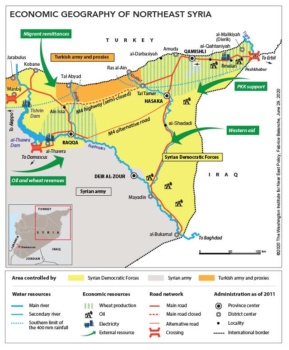A girl carries water from cisterns provided by aid groups during a water cutoff in Hasakah in northeast Syria, August 22, 2020 (AFP)
Turkey and the Assad regime have traded blame over the cutoff of water supplies to residents in northeast Syria.
On Sunday, Turkey authorities repeated that they were not responsible for halting supplies from the Allouk water station, which supplies Hasakah Province.
The officials said only three of six pumps were working. However, they cited a lack of electricity and declared that the Assad regime, cutting the power 10 times, had supplied only 27 hours in November and 30 in the first week of December on the pretext of “power plant maintenance”.
Syrian State news agency SANA wrote on Monday that water was being pumped to Hasakah Province, from other water stations, after a cutoff of “more than 25 days” by the “Turkish occupation” in Ras al-Ain on the Turkey-Syria border.
The director of water supplies in Hasakah proclaimed that Turkey and anti-Assad fighters were attacking the electrical grid that powered the Alouk station.
But Turkey’s officials said the regime had lowered the voltage of electricity supplies, limiting output from the Tishrin Dam in the regime-controlled town of al-Darbasiyah.
They said that only 29% of electricity needs in the towns of Tal Abyad and Ras al-Ayn are being met.
The officials also blamed Kurdish authorities and the YPG militia, while pro-Kurdish outlets are criticizing Ankara.
A Kurdish autonomous administration oversees much of northeast Syria, after the US-supported Syrian Democratic Forces pushed out the Islamic State between 2017 and 2019.
But Russian-backed regime units hold part of the territory, and in October 2019 Turkey and anti-Assad factions launched a cross-border operation that seized a 120-km (75-mile) corridor which includes the Alouk water station.
See also Residents Say Turkey Cuts Water Supply in Northeast Syria

Map: Washington Institute

